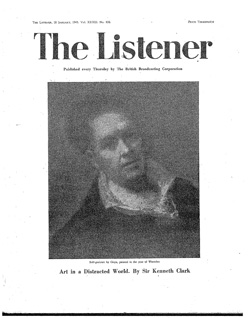Many of Reed's finer poems were first published in journals before 1945, including "Sailor's Harbour," and "Chard Whitlow" (The New Statesman and Nation), "Chrysothemis," and "Philoctetes" (New Writing & Daylight), and "A Map of Verona" (The Listener). Reed, however, had only published a mere handful longer pieces of criticism prior to "Poetry in War Time": "The End of an Impulse" (on Auden, Spender, and Day-Lewis) in the summer of 1943, and critiques of Edith Sitwell and T.S. Eliot in 1944.
The first of these two essays, "Poetry in War Time: I—The Older Poets" (.pdf), appeared in The Listener on January 18th, 1945. In it, Reed traces the influence of the French Symbolists on the great poets of his time, Eliot and Sitwell (whose work we have shown he was already intimate with, and comfortable speaking about), and their sway, in turn, on the older poets he considers most influential during the war: Edwin Muir, Louis MacNeice, and C. Day-Lewis:
The two poets of the 'thirties who have best succeeded in being also poets of the 'forties are Louis MacNeice and Cecil Day Lewis. They have always had great curiosity and initiative in exploring new musical possibilities for the lyric. Some of their earlier experiments do not wear well: the effects of MacNeice's 'The Sunlight on the Garden', for example, or some of the curious early poems of Day Lewis, where one finds the rhymes put at the four corners of a stanza like stones holding down a table-cloth at a breezy picnic. In MacNeice's Plant and Phantom and in his poems published since, flashy wantonness has all but disappeared. The final 'Cradle Song' in the volume is very haunting; and some of his later topical poems (for example 'Brother Fire') have shown an honesty and calmness of approach unusual in war-time verse.
Next, we'll continue with Part II of Reed's essays on poetry in war-time: "The Younger Poets."








